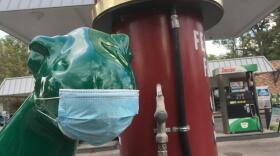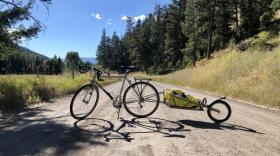Nate Hegyi, rural reporter for the , is embarking on a crisscrossing the continental divide in August and September, interviewing and listening to Americans ahead of the 2020 election. You can follow along on , an and this map.
September 15: Saratoga to Colorado border, 42 miles
An important note here: These are my first-glance takeaways. Think of this as a reporter's notebook. A mosaic of voices over the next few weeks, cycling 900 miles across four states and dozens of small towns.
It’s evening and my hands are cold writing this. I’m in the high country again – finally!
I’m a few miles north of the Colorado border at a campsite near the North Platte river. I’m surrounded by short pines, low mountains and aspen trees turning gold with the fall. The sun is setting earlier and it’s nearly dark by 8 p.m. now.
I have 42 miles of easy riding out of Saratoga, Wyoming behind me. Earlier this morning, I grabbed a green chile skillet with homefries at a cute little diner. I noticed an older man staring at me, I think, because I was wearing a mask. Nobody else was. It’s the first time since Idaho that I really felt like “the other” – as a white man travelling through a part of the country that is majority white and conservative, I haven’t received much guff yet.
But then again, these places feel like home to me. I grew up in a small town in Wisconsin that was similar to a lot of the communities I’m visiting now, and I’ve lived in Montana for the better part of 15 years.
It’s natural for me, at the gas station in Saratoga, to drink a Coors Light in the afternoon with an antelope hunter from southern New Jersey. He tells me he wants to kill a buck, take the horns and either dump the body or find someone who wants the meat.
Going through my head is that this is wanton waste and is either illegal or morally wrong at best. But I don’t say anything. I don’t want to shut him down. My role here is to listen, not share my opinions. And, for the most part, a lot of people have been happy to talk and share their opinions with me.
Either way, I haven’t received a lot of judgement or negativity.
It might be different if I was 30-year-old Kari Davi. She’s a sous chef at a local restaurant in Saratoga. She has a nose ring, tattoos and wears hip, thick-rimmed yellow glasses – not exactly the traditional attire of Western, conservative folks in communities like this.
“Just yesterday, I go out into the dining room and someone’s like, ‘You look like a criminal!’” she says. “People do look at me different. Sometimes they ask what the s*** on my face is.”
Davi isn’t an outsider though. She was born and raised in nearby Rawlins and her family lives in Saratoga. Davi dismisses the notion that folks in small towns and rural communities are inherently nice to their neighbors.
"This place does teach you that no matter what a person looks like, you have no idea what they think or feel."Kari Davi
While she acknowledges that people will brush aside personal feelings to help someone who is stuck in a ditch or out in the cold, “it’s because everything is so far apart here, and if you don’t help them, they could die,” she explains. “And so I feel like it’s a whole different thing here. It’s not so much being nice.”
She says she’ll hear locals get catty about someone who is from out of town or speaks with a different accent. She says those conversations can be “a little bit racist.” Davi is Italian but she has brown skin – which confuses people.
“It depends on where I live. They think I’m different things. Like in Arizona, they thought I was native a lot. It’s just whatever the main, brown population is there – they think I’m that,” she says.
But outside of race, there’s also an element of disliking outsiders generally here, according to Davi, who says those sentiments cross racial boundaries in south central Wyoming.
“This place does teach you that no matter what a person looks like, you have no idea what they think or feel,” she says. “In other places – like Minnesota – if you’re Mexican or Black or Somalian or anything then you hate Trump. But here? Who knows. It’s a surprise.”
I recall my conversation two days ago with Lucas Medina and Eddie Archuleta in Rawlins. They are both Hispanic, which is a voting bloc that went for Clinton by 66% in 2016. But they are in the minority that support Trump. Archuleta in particular was an avid fan who called protesters a “terrorist group” and wanted the president to “clean house” if he is reelected.
While Rawlins is a majority-white town, both Medina and Archuleta said they didn’t experience much racism nowadays there. But growing up was a different story, according to Archuleta.
“Back then there was a lot of prejudice – it was pretty rough on all sides,” he says. “There are still a few older people that are prejudiced but I think all in all Rawlins is pretty good.”
It’s important to note that both Medina and Archuleta also both fit into the mold of a “traditional” Westerner – they are conservative, own guns, drive trucks and work in the trades.
They fit in.
“Fitting in” appears to go a long way in many communities in the rural West, whether it’s remembering to close a cattle gate or helping fix a serpentine belt on a pickup truck – both of which Sharon Martinson has done over the past few months as a census worker out here.

I meet her later in the day as I’m riding out of Saratoga and towards my campsite near the Colorado border. She’s driving an electric hybrid vehicle and lives in one of Wyoming’s more progressive college towns, Laramie, which might get her some dirty looks.
“I’m driving with county five plates on a Prius,” she says, referring to the number that stamps her as someone from Laramie. “But you know what? As soon as I jump out and put your serpentine belt on, fix the hinge on your cattle truck, maybe that gets dissuaded a bit, their perception of me.”
Martinson was born and raised in Wyoming, on some open land near the outskirts of Casper. Her dad taught her a lot about mechanics and repairing things. So far, she says, she’s been greeted warmly by all of the ranchers and rural folk she meets when taking tallies for the U.S. Census Bureau. It’s similar to how I’ve felt on this trip, too. I bring up what Davi said about how she’s treated more cooly because of the way she looks – maybe folks treat us kindly because we can slip into the dominant culture pretty easily.
“We have our experience because of how people immediately perceive us, right?” Martinson says. “We’re both standing here, white people in a pretty white state, not doing anything that could be perceived as immediately offensive to anyone. Not everyone has that luxury.”
"We're both standing here, white people in a pretty white state, not doing anything that could be perceived as immediately offensive to anyone. Not everyone has that luxury."Sharon Martinson
The conversation reminds Martinson of her own prejudices – as a census taker, she walked up to really rundown mobile homes and thought, “absolutely nobody could live here.” But then someone answers the door and tells her why they haven’t completed the census yet.
“They’ve been taking care of a sick grandparent, they haven’t had time for this, they just had their kid, and they are fighting this, that and the other thing,” she says. “It’s like, you exist and you have your story. And here I am with my own prejudices.”
Meeting people on the road, far away from home, has a way of crumbling assumptions.
During our conversation, Martinson refers to a quote from Mark Twain’s 1869 travel narrative Innocents Abroad that stabs me in the chest – it’s the summation of everything I’ve been feeling for the past three weeks:
“Travel is fatal to prejudice, bigotry and narrow-mindedness, and many of our people need it sorely on these accounts. Broad, wholesome, charitable views of men and things can not be acquired by vegetating in one little corner of the earth all one’s lifetime.” — Mark Twain
America, these days, in lockdown and combating a pandemic, has been vegetating in front of our computers, our phones and our televisions. We’re getting glimpses of the world curated by others – and in some cases, it’s a dark world. That evening, I hear that the conservative radio host Glenn Beck is prepping a special on the “upcoming civil war” if Democrats win in November.
Correction: A previous version of this story misidentified Sharon Martinson as Susan Martinson and has since been updated to reflect the change.
Copyright 2020 Boise State Public Radio ∞µ∫⁄±¨¡œ. To see more, visit .







